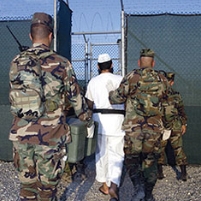Guantánamo Files Reveal Confused Mixture of Innocents Detained and Terrorists Released
Tuesday, April 26, 2011
 (photo: David P. Coleman, Department of Defense)
(photo: David P. Coleman, Department of Defense)
If they weren’t imprisoning children and old men for years on specious grounds, they were letting go terrorists still considered a threat. That’s the story of the U.S. detention center at Guantánamo, based on the most recent revelations produced by WikiLeaks.
More than 750 secret government files obtained by WikiLeaks were released to major American, British, German and Spanish media outlets, producing a new round of stories about the United States’ most controversial prison and symbol of the war on terror launched by the Bush administration.
According to The Guardian, “the files depict a system often focused less on containing dangerous terrorists or enemy fighters, than on extracting intelligence. Among inmates who proved harmless were an 89-year-old Afghan villager, suffering from senile dementia, and a 14-year-old boy who had been an innocent kidnap victim.” The 14-year-old, Naqib Ullah, was kept at Guantánamo for a year so that interrogators could see if he had any information about the men who had kidnapped him.
Other prisoners were also not “the worst of the worst.” For example, a taxi driver was held because he had general knowledge of the areas of Kabul and Khost; a sharecropper returning from a funeral was snatched because he was familiar with mountain passes; an Al Jazeera cameraman so that he could be interrogated about the news network’s operations; and a British man, Jamal al-Harith, who had been a prisoner of the Taliban, so that he could describe how the Taliban treated prisoners.
After holding an Afghan named Mohammed Nasim in custody for 10 months, U.S. analysts realized that he was not the Mohammed Nasim they had been looking for, but rather an innocent, poor farmer. Yet he was kept at Guantánamo for another 13 months anyway before being finaly sent home.
The documents also show “an intelligence operation that was tremendously dependant on informants—both prison camp snitches repeating what they’d heard from fellow captives and self-described, at times self-aggrandizing, alleged al-Qaeda insiders turned government witnesses who Pentagon records show have since been released,” wrote McClatchy Newspapers in its assessment of the documents.
In some cases, U.S. officials ignored the fact that testimony indicating a detainee was a terrorist threat had come from sources suffering from mental illness. Or the fact that evidence demonstrating guilt was obtained from someone being tortured.
The files also indicate that a large number of detainees were released from Guantánamo even though they had been designated “high risk.” According to an analysis done by The New York Times, 42 former Guantánamo prisoners actually did take part in militant activity after their release, although their enemies were varied. Of the 42, 15 were returned to Saudi Arabia, 10 to Afghanistan and 5 to Russia.
Of the 779 prisoners held at one time at Guantánamo, 172 are still there.
-David Wallechinsky, Noel Brinkerhoff
Guantánamo Leaks Lift Lid on World's Most Controversial Prison (by David Leigh, James Ball, Ian Cobain and Jason Burke, The Guardian)
Wikileaks: Secret Guantanamo Files Show U.S. Disarray (by Carol Rosenberg and Tom Lasseter, McClatchy Newspapers)
Judging Detainees’ Risk, Often with Flawed Evidence (by Scott Shane and Benjamin Weiser, New York Times)
WikiLeaks: The Uses of Guantánamo (by Amy Davidson, New Yorker)
Cheney, Rumsfeld Pushed for Torture to Find Non-Existent Saddam-9/11 Link (by Noel Brinkerhoff, AllGov)
Difficult Truths about Guantánamo (by Aaron Wallechinsky, AllGov)
Should George W. Bush be Tried for War Crimes? (by David Wallechinsky, AllGov)
- Top Stories
- Unusual News
- Where is the Money Going?
- Controversies
- U.S. and the World
- Appointments and Resignations
- Latest News
- Trump Changes Name of Republican Party
- The 2024 Election By the Numbers
- Bashar al-Assad—The Fall of a Rabid AntiSemite
- Trump Announces He Will Switch Support from Russia to Ukraine
- Americans are Unhappy with the Direction of the Country…What’s New?






Comments